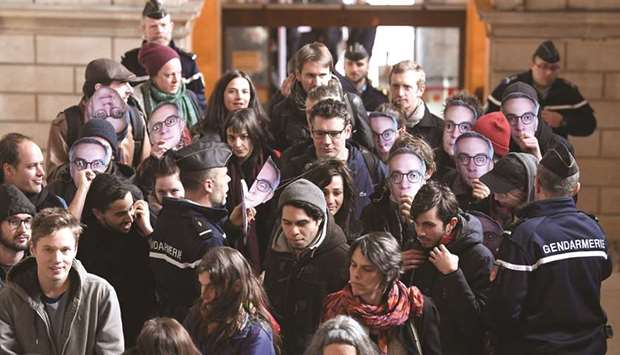The “Tarnac group”, named after the village near their communal living compound in central France, has staunchly denied all wrongdoing during more than seven years of investigations.
They were rounded up in a televised police raid on November 11, 2008, a few days after steel rods were placed on overhead power cables on three TGV lines, stranding some 20,000 passengers as more than 100 trains were cancelled.
But defence lawyers pointed to flaws in the inquiry, including testimony from a supposed witness who later said he had simply signed a document prepared by the police.
Critics accused the right-wing government of then-president Nicolas Sarkozy of whipping up fears about supposed “far-left terrorism”, although a judge eventually refused to try the Tarnac suspects on terror charges.
The group’s charismatic leader Julien Coupat, his ex-wife Yildune Levy, and two others are instead charged with a criminal conspiracy – charges that carry up to five years in prison – while two others are charged with falsifying or receiving stolen documents.
Another two people are being tried for refusing to submit samples for DNA testing.
Coupat, a 43-year-old far-left intellectual from a wealthy family, smiled as he listened to the judge detail the charges against the group.
His lawyer Jeremie Assous predicted that the trial would be “an autopsy of the fiasco” caused by police investigating the case.
The group of 20 followers Coupat gathered around him in a remote village in the Correze region was placed under surveillance after he and Levy participated in a meeting with suspected anarchists in New York in January 2008.
Media reports later claimed that a British police spy, Mark Kennedy, had infiltrated the group and reported back to his French colleagues on Coupat’s supposed contacts with far-left figures in Germany, Italy and Greece.
Kennedy, who later made headlines in Britain when he was unmasked as an undercover cop spying on environmentalists, also claimed that Coupat participated in violent anti-globalisation protests against international summit meetings.
Investigators also relied heavily on passages from a 2007 book attributed to Coupat, The Coming Insurrection, which they said showed his group had tipped over from anarchism to terrorism.
The book describes the TGV network as an “easy” target.
But Coupat refused to confirm that he was the author, and said police had faked a report claiming to prove he and Levy were in Dhuisy, a town where one of the steel rods was placed on a TGV power line on the night of November 7, 2008.
“Neither we, nor investigators, were there,” Coupat, who now directs a theatre troupe in Correze, told French television in a rare interview last week. “Up to the end, they are ridiculously sticking with something that everyone knows is both fake as well as embarrassing, even scandalous.”
Coupat was released after more than six months in detention while police tried to build a case against him.
The legal back-and-forth over whether the alleged crimes could be considered terrorism has delayed the trial for many years.
The trial is scheduled to last until March 30.



